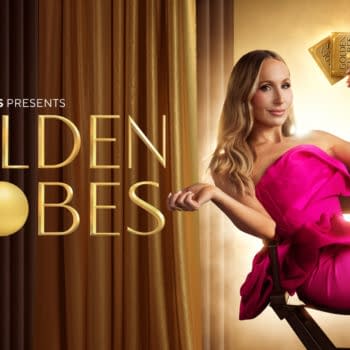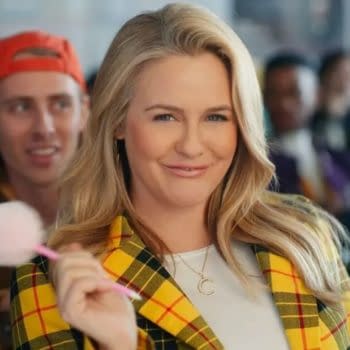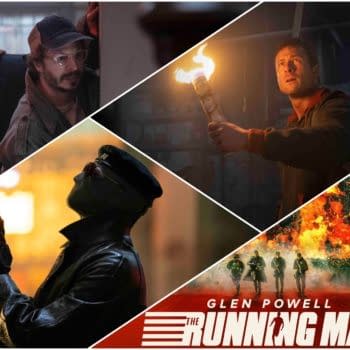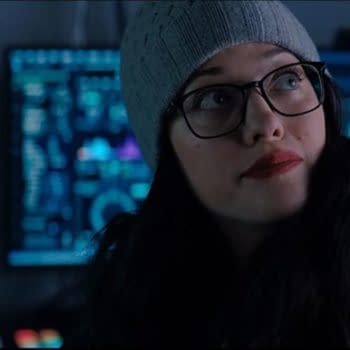Posted in: Movies | Tagged: entertainment, film, quicksilver, supheroes, wolverine, x-men, x-men days of future past
Looking Back At X-Men – The Past of Future Days
[*Mild spoilers for X-Men: Days of Future Past below. If you really don't want to know anything about the film, don't read this.]
As I'm sure is the case for many fans, seeing X-Men: Days of Future Past completed a circle for me, and reminded me very strongly of my own past, seeing the first X-Men film in 2000. Unlike some, though, seeing that film in 2000 was a strange incident in my life that stood out years later, and seemed to click into perspective when watching a film that completed 14 years of X-Men filmic history: Days of Future Past.
When I went to see X-Men in 2000 with my brothers, I was a college student who had wandered away from comics for some time, and it would be quite awhile yet before I would return to them as a source of inspiration as a writer and as a fan. I had grown up reading some comics, X-Men among them, but had put them to the side to become a "serious" English major studying primarily texts well before the 20th century, but I was on the eve of plunging into an interest in film that would eventually take me back to comics in the long run. Seeing X-Men was both uncomfortable for me and very moving. It kept me from forgetting my roots and also raised questions in my mind about my choices because just watching the film had a tremendous impact on my imagination.
There were several reasons for this. Firstly, X-Men more than any other comic had an appeal to me as a child. It started off when on Christmas Day in the late 80's, I opened a package that had been mistakenly labeled as a gift for me, but turned out to be intended for my older brother. When I peeled back the red shiny paper, I found, first to my dismay and then to my amusement, a yellow and black Wolverine figure staring back at me with beady eyes. There was a split second of confusion that still makes me laugh and I couldn't be happier with the snafu in retrospect. My brother lunged for the package, but realizing my advantage (Santa Claus had brought it for me, after all, and if anyone argued with that it meant admitting that Santa didn't exist, which no one was prepared to do out loud), I curled into a ball and defended the toy tooth and claw.

I read other comics, too, Superman, Batman, Spider-Man, and later science-fiction comics and one of my favorites, Sergio Aragones' Groo the Wanderer, but eventually high school set in and all bets seemed off. I was interested in the Batman films when they came out, particularly Tim Burton's gothic design, but then everyone loved Batman, even girls, and it wasn't unusual that I would like them too. But when my brothers convinced me to go and see X-Men in 2000, home on break from college, I almost said "no". And I wondered why at the time. Maybe it was something I just didn't want to revisit. And the film did make me revisit it.

The reason this connects with X-Men: Days of Future Past is that I didn't fully articulate all these things to myself until I saw the recent film. In fact, it was at a drinks event before attending the red carpet premier in New York that it all started slotting into place in my mind when the conversation naturally turned toward the first film and I found that other people had the same reaction to X-Men in 2000. Seeing that film then made them believe in the future of superhero films and opened the door for pop culture to become more comic-themed and less closeted when it came to comics fandom. It was the beginning of something. And I think I grasped that at the time, even as a latent fan. Realizing that it had been 14 years since that film's release suddenly gave me a perspective on how it had influenced me. I went from nearly saying "no" to seeing it in 2000 to attending a premier that I was totally excited about seeing. Yeah, that's still a long time to get from point A to point B, and it shouldn't have taken that long, I agree.
Maybe, in that context, the new film had a lot to live up to, but I'd venture to say it didn't need to, even if it did actually end up exceeding my expectations by a long shot. Because walking into that screening, I was a kid holding a shoebox hiding a tiny Wolverine with his claws taped on so I wouldn't lose them. I felt humbled given the evening's conversation. The X-Men films, however they've been received in the past 14 years, are the reigning tenured superhero films of the turn of the millennium. They did it first in a way that inspired wonder in viewers and started turning the tide on the perception of superheroes in pop culture. All of the other superhero films that have come into existence since 2000 would have been very different, or not existed at all, if plenty of guts and glory hadn't been poured into that first X-Men film. And for me, without it, I might never have returned to comics. Let's hope that it inspired some others, and continues to inspire others, to become comics readers again, too.
Days of Future Past did exceed my expectations, though. It contained that original spark from 2000 and went beyond that to simply astonish viewers. So much so that I was able to hear myself thinking, while watching it, "This is what I thought it could be. This is what I saw in it originally". As if seeing the 2000 film affected me because of its promise of greater things—someday. And that event was aptly named Days of Future Past.
Some of the things that occurred to me about the film are as follows: in the film, the X-Men are the seed of their own future that isn't formed yet for them (though it is for viewers) and that's what the film is really about. Their powers accentuate their ability to craft and direct their future, often with dire consequences, and that makes for uniquely dramatic storytelling when the viewer gets a privileged perspective on time, as they do for this film. Anyone who likes science-fiction will be familiar with the idea that any given moment could contain limitless divergent timelines, but even though the film really explores two possible futures, watching it made me think about all of the possible futures specific junctures for the characters could contain. In that way, the film felt even bigger than itself for me. My mind moved back to the first film and the events set in motion then, then jumped to the more recent (but far) past of X-Men: First Class, trying to tease out those other possible junctures where time seemed more malleable.
For me, the biggest symbol of the role of time in the film came from watching Quicksilver, and I know there's no way I'm alone in that. The time, craftsmanship, and sheer exuberance given to Quicksilver's key scene in the bowels of the Pentagon are such that people will be talking about it for a very, very long time. During the premier, the entire audience burst into a spontaneous and lengthy round of applause. This, particularly, was when I felt that the promise of the first film had been more fully realized. And weirdly, it made me think of all the points in the other films that had been waystations to that juncture in cinematic history, all the little steps in effects and attempts at inspiring wonder that had been necessary to reach the composition of that scene. And that made it all even a bigger deal for me. It's not hard to feel like you're having an epiphany when watching that scene. And having seen it, there seemed like an ironic ring behind Quicksilver's earlier words to his guests when they visited his basement lair to find him, asking them who would believe them if they tried to tell others what they'd seen. No, we wouldn't have believed it, not really, unless we'd seen it for ourselves either.
There's so much I could say about the significance of character development in this film, the way it focuses in and gives us a fairly unflinching psychological profile of Mystique, Magneto, and Xavier, as well as several other characters, but in keeping with my action figure entrance to the world of X-Men, I was going to be particularly delighted by the role of Wolverine. Not that you ever really get to walk too far down the pathways of his mind no matter how filmmakers try to explore his position as a lead character. He will continue to resist definition and limitation as a figure, but here the film slows down around him enough to make you feel like he's much more than a placeholder for an action hero. He's an observer, a thinker, and a subject for identification for the viewer. And for that reason, Days of Future Past actually raises his stature as a character, something he very much deserves. In fact, he's the perfect candidate as a guide through time given his own long, confused history. He's seasoned in dealing with reconstructing timelines and you could say his work experience makes him the right man for the job well beyond his mutant abilities.
The conflicts that also lie at the heart of Days of Future Past were inherent, if you think about it, in X-Men in 2000. And that's why it's easy to see that the films have come full circle in many ways, not just in their construction of time and events. But I'd like to suggest that the social themes present in the first film are now fully realized in Days of Future Past much more than they were in 2000. Part of that is because this film builds on all the others and therefore can reach further with the ideas of oppression, cruelty, misunderstanding, revenge, and the like. But it's also because society has moved onward in 14 years and the things tentatively put forward in 2000 can now be plainly spelled out as part of an already ongoing conversation. In fact, our society had to catch up to X-Men of 2000 to create a film comprehensible to us in this way in 2014. It's not surprising that the conclusion of Days of Future Past takes us back to the hub of potential, to the genesis of possible futures, as if reminding us that it's still in our hands to create a better future. We haven't yet taken the irrevocable steps that would make the world a restrictive, doomed place. In that vision of possibility we are encouraged to ask ourselves, of course, what future we will choose and how we will make sure to choose it.
For me, I guess I ask myself what kind of future I would have had if I had never received the Wolverine figure, if Santa had been less forgetful, if I had been too nonchalant to see the first X-Men film with my brothers. I might have still come back to comics, but I would have missed out on a fairly mind-blowing revelation about the ways in which pop culture has expanded and spread to become a metaphor for more and more of the population about the ways in which we can critique society. It's those near-misses that surprise you in retrospect, and that pretty much sums up Days of Future Past too.
Hannah Means-Shannon is EIC at Bleeding Cool and @hannahmenzies on Twitter






















